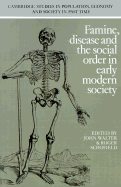Book contents
- Frontmatter
- Contents
- List of contributors
- List of figures
- List of tables
- Andrew Appleby: A personal appreciation
- A bibliography of Andrew B. Appleby's principal works in chronological order
- List of abbreviations
- 1 Famine, disease and crisis mortality in early modern society
- 2 The social economy of dearth in early modern England
- 3 Death in Whickham
- 4 The response to plague in early modern England: public policies and their consequences
- 5 Demographic crises and subsistence crises in France, 1650-1725
- 6 Markets and mortality in France, 1600–1789
- 7 Some reflections on corn yields and prices in pre-industrial economies
- 8 Family structure, demographic behaviour, and economic growth
- Consolidated bibliography
- Index
- Cambridge Studies in Population, Economy and Society in Past Time
Andrew Appleby: A personal appreciation
Published online by Cambridge University Press: 01 June 2011
- Frontmatter
- Contents
- List of contributors
- List of figures
- List of tables
- Andrew Appleby: A personal appreciation
- A bibliography of Andrew B. Appleby's principal works in chronological order
- List of abbreviations
- 1 Famine, disease and crisis mortality in early modern society
- 2 The social economy of dearth in early modern England
- 3 Death in Whickham
- 4 The response to plague in early modern England: public policies and their consequences
- 5 Demographic crises and subsistence crises in France, 1650-1725
- 6 Markets and mortality in France, 1600–1789
- 7 Some reflections on corn yields and prices in pre-industrial economies
- 8 Family structure, demographic behaviour, and economic growth
- Consolidated bibliography
- Index
- Cambridge Studies in Population, Economy and Society in Past Time
Summary
Andrew Appleby was a tall, quiet, judicious man – a large figure and a considerable presence. He came late to the writing of history, from a previous career helping to run a newspaper which his family owned in San Diego County, Southern California. The reasons why he changed were at bottom moral reasons, and the same could be said, I think, about his choice of a line of investigation. He felt a personal responsibility for the men and women of the past. He cared about what really weighed upon them much more than he cared about the traditional preoccupations of historians as he found them to be when he took up research.
Hence his settled concern with hunger, disease and death amongst our ancestors and predecessors in pre-industrial times, and his unwavering determination to get at the truth of these matters as far as that could possibly be done. The impression he gave to me was that he could afford to stand aside and wait until others saw things in the light in which he saw them himself. What a sad, sad thing that he should have died before that change had completely come about.
Nevertheless in the seven or eight years during which he cultivated his chosen territory, years when he was fulfilling the burdensome stint of teaching demanded by the State University of California, his output of books, articles and addresses was enormous.
- Type
- Chapter
- Information
- Famine, Disease and the Social Order in Early Modern Society , pp. xi - xiiPublisher: Cambridge University PressPrint publication year: 1989

